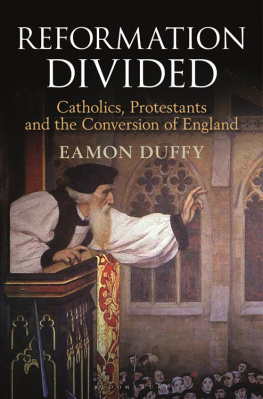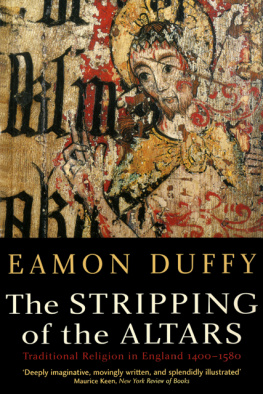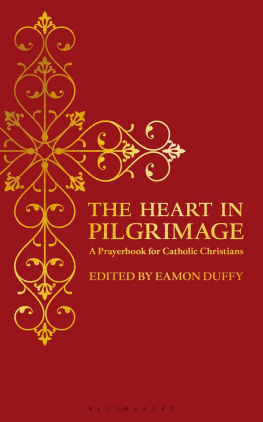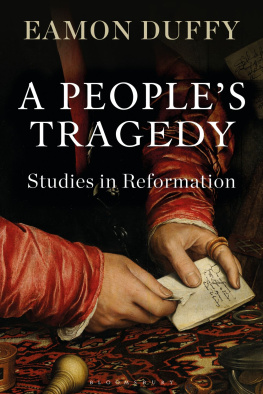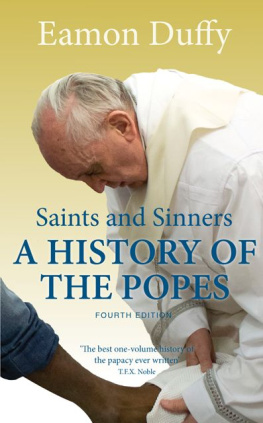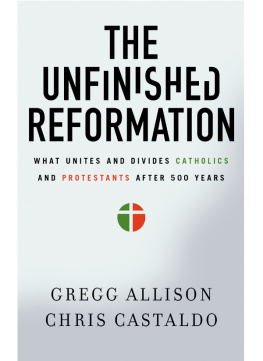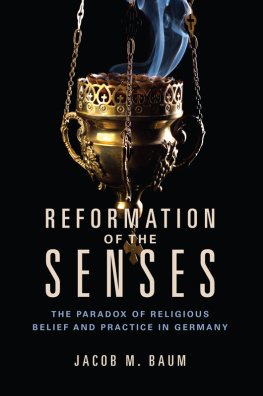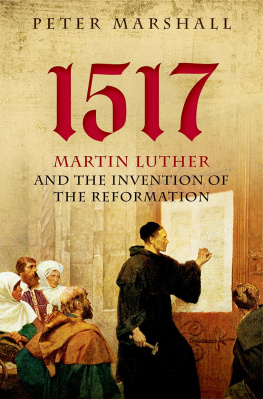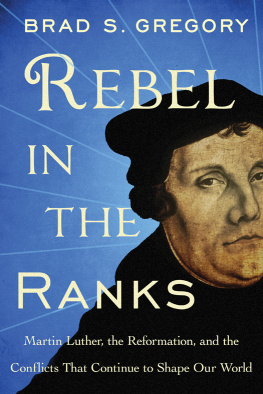
REFORMATION DIVIDED

In 1517 an obscure German theologian from an undistinguished new university initiated a debate about popular religious practice which was destined to open up the greatest geological faultline in European civilisation. Martin Luthers angry critique of the sordid late medieval traffic in religious blessings known as indulgences would rapidly escalate into a more fundamental challenge to the theological structures which had underpinned the evolution of Western society since the fall of the Roman empire. There ensued more than a century of fratricidal ideological conflict, in which many thousands would die, and the religious, social and political map of the European continent would be redrawn.
This stupendous upheaval has usually been known as the Reformation, an unsatisfactory designation concealing a battery of value judgements. Though the new religious identities which emerged from these conflicts shared a common repudiation of the papacy and of the allegedly materialistic religious system which the papacy headed, they were profoundly, often murderously, divided among themselves on almost everything else. Reformation, moreover, with its implication that a good form of Christianity replaced a bad one, begs the question of the credibility, health and religious worth of the beliefs and practices reformed communities rejected. Till comparatively recently, these Reformation movements were viewed as the product of a single energy, unwitting agents or heralds of modernity, and so, self-evidently superior to the medieval Catholicism they replaced. It was a superiority thought to have been demonstrated, among other ways, by the rapidity with which the old religion collapsed before them.
Hence older anglophone histories of the reformation commonly started with a brief rsum of the late medieval background, designed to demonstrate the dysfunctional character of late medieval Christianity, with the bulk of the narrative focused on the spread of Protestantism in the 50 years or so after 1517. The textbook which dominated the study of the English reformation in schools and universities for two generations from 1965 suggested that the reformation was all over, bar the shouting, by 1559.
Few of these assumptions have worn well. We are far more aware now of the richness, resilience and social embedding of the late medieval religion so often caricatured or ignored in the older narratives. We are correspondingly more alert to the protracted and difficult labour involved in what Patrick Collinson called the birthpangs of reformation, Catholic or Protestant.Eire is a Catholic originally from Cuba, making the convergence of their historiographical choices all the more telling.
The history of these reformations continues to fascinate and to matter because it is universally recognised that many of the dominant features of modernity originated in the religious upheavals of the sixteenth and seventeenth centuries. That legacy itself, of course, is highly contested. Everyone recognises that the split between Catholics and Protestants (easily parodied as the warm south versus the cold north, wine drinkers versus beer drinkers, and so on) created ideological, cultural and political divisions which constitute the shaping fact of European identity, and hence of Europes impact on the rest of the world.
By contrast, Brad Gregorys recent study of the long-term legacy of the reformation era suggested that the Protestant assault on the intellectual and moral underpinning of Catholic Christianity fatally if unintentionally undermined the coherence of the Western intellectual and moral tradition. Gregory, a distinguished American Catholic historian, is the author of the best study of the persecution of religious minorities in early modern Europe, and an authority on the radical early Protestant sectarians usually lumped together under the blanket term Anabaptists. Nevertheless he believes that the market of values and the control of religion by the modern state in the name of religious liberty has brought about the progressive privatisation and exclusion of religion from the public sphere problems, he argues, which stem either directly or indirectly from the activities of the sixteenth-century reformers.
Catholic polemics against the errors of the reformers have a long pedigree, of course, and in modern times it is easy to think of precedents for Gregorys approach, some of them very distinguished Jacques In fact Gregory gives short shrift to the Weber thesis that the rise of capitalism was facilitated and advanced by a Protestant work ethic, and is emphatic that the reformers had no intention either of disenchanting the universe or of legitimating acquisitiveness, both of which are Weberian themes. Nevertheless, he argues that in the long term the Protestant repudiation of a sacramental understanding of the material world opened the door to precisely such a disenchantment, by facilitating the removal of the question of God from scientific discourse about the natural world. The reformations sharp distinction between the realms of matter and spirit and its hostility to scholasticism, he believes, ended more than a thousand years of Christianity as a framework for shared intellectual life in the Latin West.
Gregorys argument sharpens when he turns to the responsibility of the reformation for other aspects of secularism: the hyperpluralism of modern Western society, rooted in the absence of any rational basis for agreement about life questions of value and truth, and hence of any rational way of arriving at a social platform based on shared beliefs. Here Gregorys trajectory as a historian of radical Protestantism is crucial to his argument. Protestantism is often thought of as a single force, comparable to the Catholic Church. But this, he insists, is an illusion, created by the accident of the social and political conservativism of magisterial reformers like Calvin and Luther, and the emergence of Protestant states which embraced one or other of those two Protestant syntheses and enforced a more or less traditional kind of political and moral order. In fact, however, underneath this apparent coherence, which was purely pragmatic, the fundamental reformation principle of sola scriptura, and the absolute rejection of tradition as a source of religious truth, proved a radical solvent which made impossible any agreement about truth elicited by communal effort within the context of a shared hermeneutic tradition.radical disagreements would ultimately lead to the emergence of societies like ours, which can maintain their unity only by banishing what Gregory calls the life questions from the public forum. Religious toleration as a solution to the internal disunities of the early modern state in fact proved a powerful incubator of radical individualism, and ultimately of moral chaos. The murderous religious controversies of the early modern era persuaded many in the long term that, since religious disagreements could not be resolved, they should not matter, and did not matter.
And in this marginalising of religious truth as impossibly elusive, Gregory sees one of the roots of the acquisitive society. All the major reformers as well as their radical Protestant opponents denounced excessive wealth in traditional Christian terms, and the roots of both capitalism and consumerism were already evident in medieval and renaissance societies. Nevertheless, the abolition of the vowed religious life of monks and nuns removed a powerful if often compromised institutional witness to Christian ambivalence about material prosperity, while pulling in the opposite direction, the intractableness of post-reformation religious disagreements contributed to the emergence of societies which found their rationale in purely materialistic and acquisitive values the protection of property and the contractual guarantee of the rights of the individual. In the pioneering early modern secular states, in particular the Dutch Republic, Gregory argues, men and women decided to stop killing each other over what seemed increasingly irresolvable religious differences, and went shopping instead. In the long run, religion became a private matter, and this privatisation became one of the building blocks of Enlightenment social theory. It does me no injury, declared Thomas Jefferson, for my neighbour to say there are twenty gods or no god. It neither picks my pocket nor breaks my leg.
Next page
